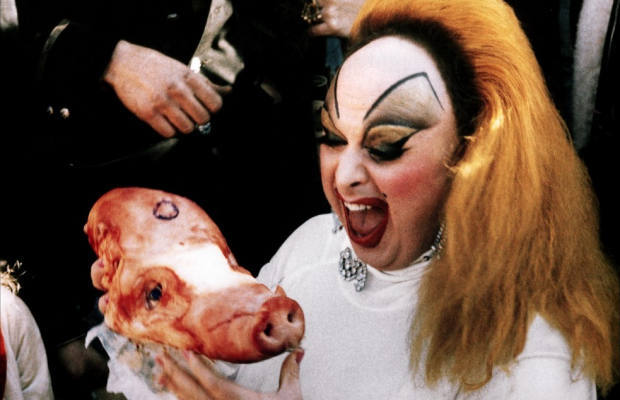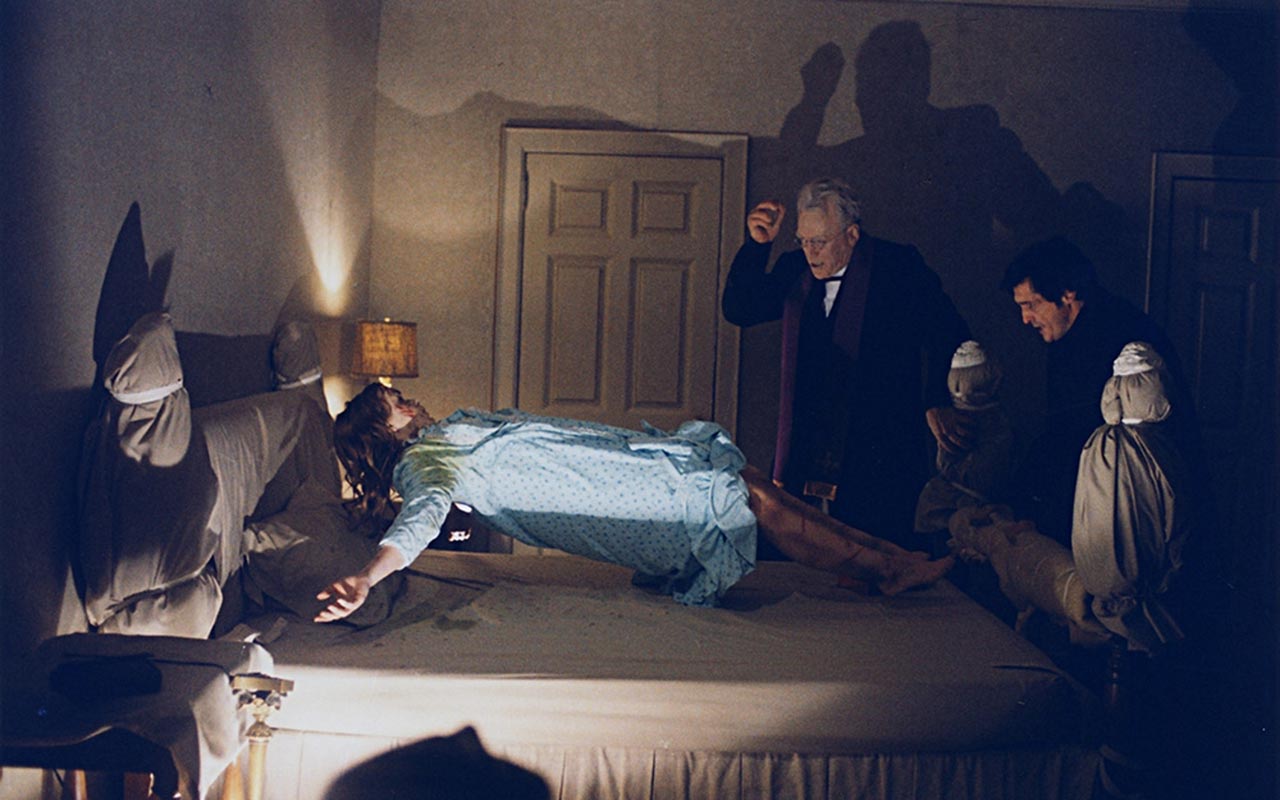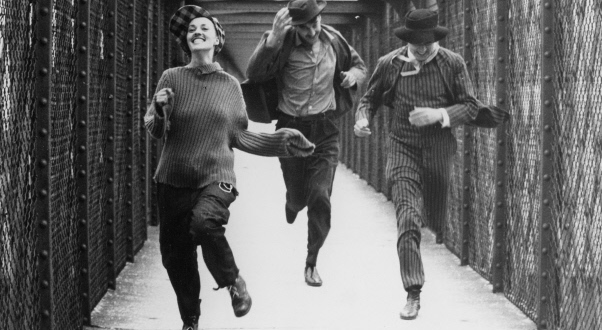
With the advent of commercially marketed films, in the early 1900s, there were public calls from religious groups for government regulation of the film industry. According to the ACLU’s webpage on film censorship, beginning in 1909 a National Board of Censorship representing various Protestant denominations was established and called for the regulation of commercial films.
The powerful Women’s Christian Temperance Union followed shortly, labeling films as addictive and capable of inducing immoral behavior through their glorification of sex and violence.
This and other outside pressures for government regulation of a medium that could potentially have an immense and negative social influence led the film industry to openly police itself with the creation of the Motion Picture Association of America and its production code, meant to limit material that might be felt to be morally problematic and a bad influence on viewers.
Enter the Legion of Decency. This was a Catholic organization that, despite the MPAA, operated from the 1930s to 1980. It regularly published a list of movies it called on other Catholics to boycott. In its initial stage it acquired the signatures of 10 million Catholics who pledged not to see the movies on this ‘banned’ list.
The Legion did not call for government regulation because they were confident they could handle this matter of censorship themselves. And they did. Films were regularly butchered to meet Legion standards. There’s a good chance that one of your favorite films from the 30s through 70s was at least partially butchered – Casablanca, for instance, endured edits to please the Legion.
So, yes, on the one hand Hollywood is a shady, profit-driven place and would probably have produced films that influenced young people to do anti-social things in order to make an extra buck or two. Yet, in almost all, if not all cases, the artistic factor or thought-provoking factor in a serious film would seem to trump or negate any alleged ‘damage’ the film might cause.
Sometimes the best films are examinations of ‘evil’ in which the evil must, obviously, be depicted. The Legion of Decency clearly did not always try to differentiate between serious films and pure exploitation films. Here are 20 films worth your time that your moral guardians thought would corrupt you.
1. Last Tango in Paris (Bertolucci, 1972)

This film was attacked by the National Organization for Women, banned in Canada and Bertolucci was found guilty of obscenity in Italy for it; so it’s no surprise that the Legion would ban it too. Was this a film of no redeeming artistic value involving the objectification and exploitation of a woman or an artistically experimental film involving themes of sexual liberation and exploration? Even Maria Schneider, the actress who played Jeanne, said she felt violated in the film and criticized both Marlon Brando and Bertolucci.
In the film, Paul, a middle-aged American, meets Jeanne, a young woman in her 20s, while both are searching for a new apartment. With little pretense and a lot of non-verbal communication, they begin a regular series of meetings in the apartment during which they experiment with various types of sexual acts. At one point Paul encourages Jeanne to grease up her fist with butter and force it up his butt, because he wants her to explore inside “the asshole of death”.
The Legion’s rationale: The Legion obviously felt that this was not a good family values film. Sexual exploration in itself was a gratuitous and self-absorbed immoral pursuit that flew in the face of finding one partner and having sex with him/her for 50 years in exchange for a committed, deep, companionate love. I think, however, that this film was meant to be a totally unrealistic thought-experiment.
Indeed, one of the questions Bertolucci might have been asking was, basically, can we feel fulfillment having anonymous, wild sex? At the end Paul abandons this idea and wants something meaningful…whereupon he is shot by Jeanne. Bertolucci seems to be examining the limits of sexual desire itself, in its various manifestations between two people. And they arrested the guy for this.
2. Pink Flamingos (Waters, 1972)

I scanned through the Book of Leviticus just now, and there’s nothing explicit about not eating dog poop. On second thought, this film could have been banned due to the scene of the man having sex with a chicken. I’m pretty sure the Bible frowns on that. Indeed, John Waters has much in this film to frighten and outrage a Bible-thumper – some folks consider this to be THE most disgusting film ever.
It seems that Waters was inspired by Andy Warhol’s approach to film-making as well as being inspired by the Manson-family murders and the ensuing trial. Divine is the matriarch of a benign disgusting family that goes to war against a malevolent disgusting family – each trying to out-disgust the other.
Waters provided barf bags to folks who attended the screenings. Interestingly, after Divine ate the dog crap he called a hospital and said, “I’m worried, my child just ate some dog crap…what should I do?” The doctor said, “Oh, don’t worry. This happens all the time.”
The Legion’s rationale: I guess it’s the old slippery slope argument. Moral restrictions against sexual acts other than the missionary position get stretched once you learn that people are doing these things and the social order isn’t falling apart (maybe it’s a shame that there isn’t a sexual act that can transform the social order).
Every kink imaginable was in Pink Flamingos. If we allow a film that shows a transvestite eating dog poop, soon we’ll have a film with…hmmm. Yeah, this one troubled our moral guardians but did not seem to incite rampant dog poop consumption.
3. Spartacus (Kubrick, 1960)

It looks as if pressure from the League as well as the MPAA (which demanded bigger loin cloths) caused this film to be radically censored/edited to the extreme chagrin of Stanley Kubrick, who was to say that this great film had everything…except a story. Our moral guardians seemed to feel that a group of slaves overthrowing their masters might imply something commie-pinko, and so the several battle scenes where the slaves beat the masters were…you guessed it…sliced from the film.
There was also, apparently, a scene in which a male character is half naked in a bath with another guy and says that sometimes he likes eating oysters, other times snails. That was considered an unacceptable double entendre implying bisexuality. Despite all the slicing to satisfy certain people, the film was still banned by the League.
The League’s rationale: it seems that Howard Fast (whose book was the source of the script by Dalton Trumbo) deliberately portrayed Spartacus as a type of Christ before Christ and the League seemed to feel that despite the numerous cuts that eviscerated the film, people might begin to think a ‘messiah’ should really be more of a fightin’ man than a turning-water-into-wine sort of guy.
4. The Exorcist (Friedkin, 1973)

Ok, so the little girl sticks the crucifix where the sun don’t shine. OK, that’s called realism. She’s possessed! What else are a legion of demons supposed to do if you give them one of those things!? Don’t give a crucifix to a girl who is possessed! Hello!? And then there’s all the dirty language.
And the vomit and the nasty verbal attacks like when the girl tells the priest that his mom has become an oral sex expert in hell. Well, this is a type of realism as well. Is the devil supposed to insult people like the French guy in Monty Python and the Holy Grail – “Your mother is a hamster and your father smells of elderberry!” I don’t think so.
The League’s rationale: I’m guessing it was only partly the language and sexual stuff, but these demons are certainly creative in their vulgarity and they strive to shock.
It could also have been a concern that the film would lead folks to self-diagnose themselves as possessed and expect the church to do something instead of their doctors (recall the film The Exorcism of Emily Rose?). Also, the devil kind of wins in this movie. The old priest and all his prayers can’t get the thing out of her. The film, frankly, kind of makes the God of the Legion’s church look like a wimp. Ban it!
5. Jules and Jim (Truffaut, 1962)

So you have a French guy and a Austrian guy and they form a super-tight relationship – an amazingly close friendship. Then you throw in Catherine who, to make a long story short, first picks one guy and then switches to the other. There are lots of redeeming elements to this film. The friendship of Jules and Jim is, in itself, interesting to watch and think about.
The Legion’s rationale: Marriage was supposed to be a forever thing, so when Catherine switches in mid-stream, well, that got the Legion’s dander up. Can’t have folks switching in mid-stream, what will this world come to!?
6. Taxi Driver (Scorsese, 1975)

I am guessing some Legion folks pointed to Taxi Driver as a legitimization of their role. Just a few years after its release, John Hinckley Jr. admitted to being inspired by this film to attempt to assassinate Ronald Reagan. In the film Travis Bickle wishes to assassinate a political figure because he is dumped by a woman who works for his campaign and because he thinks her boyfriend (played by Albert Brooks) is an effete horse’s ass.
Bickle has also become disgusted by the extent to which life in New York City has deteriorated. The moral turpitude around him engenders a vigilante attitude and Scorsese seemed to have created his own thought experiment about one way that people often respond to social ills. The moral response often engendered by evil is of evil itself and not THE moral response we need to eliminate evil.
The Legion’s rationale: They would say, “See! I told you so! A nut wants to kill a politician in this film and a nut tries to kill the president in reality! Hollywood can’t regulate itself!” So Legion, how did Hinckley get his gun? Why are guns available for nuts? Hey religious folks, let’s get these guns off the streets and we can watch all the cool films we want to watch.